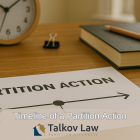Arvin Real Estate Partition Lawyer
Talkov Law’s attorneys serving Kern County are exceptionally experienced in California partition actions and have conducted over 470 for our satisfied clients. A California partition action is a law that allows co-owners of real property to divide the property among themselves. The partition statutes provide a legal mechanism for co-owners to divide the property without having to go through the court system. The partition statutes also provide a way for co-owners to force the sale of the property if they cannot agree on how to divide it. The partition statutes also set out the procedures for the sale of the property and how the proceeds of the sale will be divided among the co-owners. The partition statutes also provide for the payment of costs associated with the sale of the property.
Our team of partition attorneys can assist co-owners with frequently asked questions about partitions, such as:
- Can I still file a partition if my co-owner has filed for bankruptcy? Yes, the partition action can generally be filed in the bankruptcy court or the bankruptcy court can apply state partition law to allow offsets when the co-owned property is sold by the bankruptcy trustee.
- Can a minority owner force the sale of a property? There is no requirement for a majority vote for partition. Rather, an co-owner of any interest in property can force the sale.
- When is a partition action right for my dispute? Generally, parties who can reach their own resolution of a co-ownership dispute are not reading websites about partition law. If you are reading this article, chances are that your co-ownership dispute has reached a level where legal options are being considered. Filing a partition action will bring about a certain result to the co-ownership dispute, rather than letting it linger for years on end. However, if the parties are very close to a settlement, it may be wise to consider a resolution.
- Who can file a partition action in California? Generally, any co-owner of real property can file a partition action.
- What are the steps involved in a partition action in California? The first step is to file a partition complaint in California, which is followed by a request for the court to enter an interlocutory judgment of partition, thereby appointing a partition referee under the partition statutes.
Arvin is a small city located in Kern County, California. It is situated in the San Joaquin Valley, about 15 miles southeast of Bakersfield. The city has a population of around 20,000 people and is known for its agricultural production, particularly of grapes, almonds, and pistachios. The city is also home to a number of parks and recreational areas, including the Arvin Community Park, which features a playground, picnic areas, and a skate park. The city is served by the Arvin Union School District, which includes four elementary schools, one middle school, and one high school.
Speak to Our Arvin Partition Attorneys Today
Call our Kern County Partition Attorneys today to end your co-ownership dispute. You don’t pay until the house is sold!
Call us at (661) 999-3300 or contact us below to schedule a free, 15-minute consultation
Withington v. Collins – Partition Action Case Study
In the legal case of Withington v. Collins, 60 Cal.App.2d 110 (1943), the issue of partition was at the center of the dispute. The case involved a dispute between two co-owners of a parcel of real property. The plaintiff, Withington, sought to partition the property, while the defendant, Collins, argued that the property should not be partitioned. The court ultimately held that the property should be partitioned, but that the partition should be made in such a way that the interests of both parties were taken into account. The court also held that the partition should be made in such a way that the interests of both parties were taken into account, and that the partition should be made in such a way that the interests of both parties were taken into account. The court also held that the partition should be made in such a way that the interests of both parties were taken into account, and that the partition should be made in such a way that the interests of both parties were taken into account. The court also held that the partition should be made in such a way that the interests of both parties were taken into account, and that the partition should be made in such a way that the interests of both parties were taken into account.
Frequently Asked Questions About Partitions in Arvin
How Much Does a Partition Action Cost in Arvin?
The costs of a partition action—including attorney fees, court fees, appraiser fees, and other legal expenses—are typically around $20,000. While some cases may incur fees as low as $5,000 or exceed $20,000, depending on their complexity, these expenses are generally shared among the co-owners. The court may also adjust the distribution of these costs based on each party’s level of involvement or responsibility, ensuring a fairer allocation when needed.
Who Can File a Partition Action in Arvin?
A partition action can be filed by any co-owner of a property, excluding married couples who own it as community property. A majority ownership is not required to initiate a partition action. Common situations for partition actions include disputes among siblings inheriting property, former romantic partners, friends or family members who purchased property together, and divorced couples.
Who Pays for a Partition Action?
In Arvin, each party typically pays for their own attorney’s fees (known as the “American Rule”). However, California partition law allows for an exception to this rule, stating that “the court shall apportion the costs of partition among the parties in proportion to their interests or make such other apportionment as may be equitable.” California Code of Civil Procedure 874.040. Indeed, the court may award “reasonable attorney’s fees incurred or paid by a party for the common benefit.” California Code of Civil Procedure 874.010(a).
Can a Partition Action Be Stopped in Arvin?
Generally, a partition action cannot be stopped, but a defendant may be able to buy time to seek a resolution. Eventually, however, the plaintiff can generally force the sale of the property based on the absolute right to partition.
Contact our Team of Experienced Partition Lawyers Serving the City of Arvin, County of Kern, California
Our Arvin partition litigation attorneys will work diligently to obtain a favorable outcome on your behalf, whether by negotiation or litigation. Talkov Law Partition Attorneys unlocks access to justice for co-owners by funding your case. For qualified cases, you pay no fees until we successfully partition your property by obtaining a sale on the market or to your co-owner! For a free consultation with California’s first and largest team of partition attorneys at Talkov Law, call (661) 999-3300 or contact us online today.
Serving Areas Throughout California
Bakersfield, Lamont, Weedpatch, Edison, Di Giorgio, Mettler, Grapevine, Lebec, and Bear Valley Springs































































































































